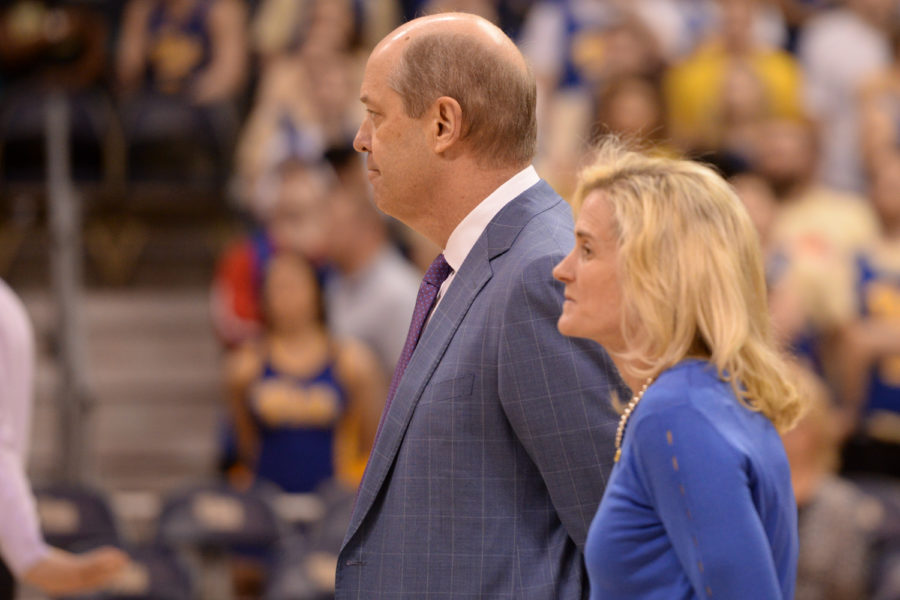Pitt men’s basketball, football hit with NCAA probation
John Hamilton | Former Managing Editor
Former men’s basketball head coach Kevin Stallings was one of two coaches cited by the NCAA as having committed violations.
February 20, 2020
The NCAA announced at noon Thursday that both the Pitt men’s basketball and football programs committed coaching infractions from August 2015 to March 2018. According to a release, the violations were committed by former men’s basketball head coach Kevin Stallings and current football head coach Pat Narduzzi, and subsequent penalties were negotiated by both Pitt and the NCAA.
Pitt announced that when it discovered that the violations had taken place, it self-reported them to the NCAA in September of 2018 and the investigation began soon after.
Stallings allowed and instructed three non-coaching staff members to perform coaching duties, meaning that Pitt surpassed the number of “countable coaches” allowed by the NCAA. He did this by creating an alert system — wherein team managers sounded the scoring buzzer to indicate the presence of administrators — that ensured these coaches weren’t seen leading practice and deleted practice video that showed those coaches present.
The NCAA report also states that Stallings “did not promote an atmosphere for compliance” and “did not end the violations after being warned by athletics department administrators.”
The basketball program also committed an infraction by producing personalized recruiting videos for 12 recruits to watch when they visited Pitt officially or unofficially from May to September of 2017.
Former director of basketball operations at the time, Dan Cage, refused to take part in an enforcement interview about his violations as a non-coaching staff member after he left Pitt and violated NCAA ethical conduct rules.
The football program was found to have committed similar coaching-related infractions from August to November of 2017. Narduzzi was present at practice when three quality control staff members were performing coaching duties, which exceeded the number of allowable coaches. These “coaching duties” included holding play cards for the scout team and occasionally throwing footballs, which were deemed impermissible.
In another instance, from Oct. 22 to Nov. 23, 2017, Narduzzi requested the help of a quality control staff member during practice and again exceeded the number of permissible coaches.
The NCAA reported that the University made acceptable checks on the program, but that the violations weren’t discovered because the program would play music to alert when outside parties were at the present at the practice facility. The quality control staff members said that they knew not to be near the student athletes when the music was playing.
The case was settled with a negotiated resolution process, which was used instead of a hearing because Pitt, Narduzzi and the enforcement staff agreed upon the penalties and violations. Both Stallings and Cage did not participate in this process.
The NCAA gave Level II-mitigated penalties for Pitt, and Narduzzi agreed to Level II standard penalties. Stallings received Level II aggravated penalties and Cage received Level I aggravated.
The penalties for Pitt include three years probation that will end on Feb. 19, 2023, but no scholarship reductions or postseason restrictions in basketball or football. There is also a $5,000 fine for both programs and each will have 0.5% of their budget taken out as well.
The basketball program must reduce its countable coaches at practice by one for 16 hours during the 2019-20 academic year, reduce its countable athletically related activity hours from 20 to 18 during the season and from eight to seven during out-of-season.
Pitt basketball also had to reduce recruiting person days by 17 during the 2017-18 academic year.
Narduzzi will deal with a show-cause order that withholds him from two practices during August. He already didn’t participate for one week of off-campus recruiting during the Dec. 1, 2019, to Feb. 1, 2020, contact period.
The football program already incurred a reduction in its countable “athletically related activities” by eight hours and had to reduce the number of countable coaches by one for two days of practice during the 2018 season.
They will also have to reduce the number of countable coaches by one for four days of practice and two quality control members must not be at practice for three days during the 2019-20 academic year.
The penalties were harsher for Stallings, who was handed a three-year show-cause order, which means that if he is employed by a university during this time, he will have to be suspended for 30% of his first season.
Cage received a three-year show-cause order and during this period, if he is employed, that the university will have to restrict him from athletically related duties unless it can show why the restrictions shouldn’t apply.



